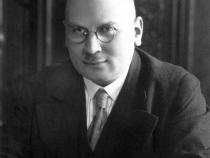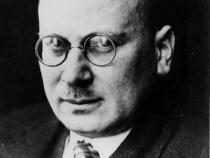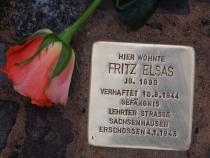Location
Patschkauer Weg 41
District
Lichterfelde
Stone was laid
March 2009
Born
11 July 1890 in Cannstatt
Excecuted
04 January 1945 in Sachsenhausen
I am trying to find out from Steiniger [DNVP city councillor and member of the Prussian state council] what is going to happen after the elections. For two days there has been a rumour that a decree is being prepared in the Prussian Ministry of the Interior which will allow local public officers to be suspended too. If it's true, we're all out.
Fritz Elsas, diary entry, 27. 2. 1933
Fritz Elsas came from a family of Jewish industrialists. He studied law and political science and was awarded a PhD in 1912. He also converted to Christianity that year. In 1914, he volunteered for the army but was rejected. From 1915 he worked for the city of Stuttgart, working his way up to the position of director of the city food authority. In 1919, he joined the DDP and was elected to the Stuttgart city council. He declined to run for Lord Mayor in 1921, although he had good chances of being elected, because of anti-Semitic attacks. From 1924 to 1926, Elsas was a member of the Wuerttemberg state parliament. In 1926, he was appointed vice president and a managing board member of the German and Prussian cities’ assembly in Berlin. In 1931, the Berlin city council elected him mayor. On 14.3.1933, Elsas applied for leave so as to avoid being officially dismissed. He was forced to retire half a year later because of his Jewish background. In the following years, he worked as an economic and foreign currency expert. In June 1937, he was arrested for alleged currency offences and remained in detention until November. He had been in contact with a liberal resistance circle around the Berlin judge Ernst Strassman and the Hamburg businessman Hans Robinsohn since 1934. On their instructions, Elsas, who was also in close contact with Carl Goerdeler, worked on a proclamation which Goerdeler intended to make to the public after Hitler’s assassination. Goerderler had been designated for the post of head of the Reich Chancellery in the new government. On 10.8.1944, Elsas was arrested by the Gestapo and severely physically abused. He was put in solitary confinement in Lehrter Strasse prison, Berlin. In late December 1944, he was transferred to Sachsenhausen concentration camp, where he was shot dead in early January 1945. On 18.1.1945, the Deutsche Reichsanzeiger newspaper announced the confiscation of his estate for the German Reich. Marie Elsas and her daughters were arrested under kin liability laws and first sent to Berlin-Moabit prison, then to Buchenwald and finally to Ravensbrueck women's concentration camp. They were released at the end of the war. On 20.7.1954, 10 years after the failed coup, a street was named after Fritz Elsas in the Berlin district of Schöneberg in the presence of President Heuss.
Fritz Elsas was a municipal councillor 1931 – 1933 (Staatspartei)
Fritz Elsas, diary entry, 27. 2. 1933
Fritz Elsas came from a family of Jewish industrialists. He studied law and political science and was awarded a PhD in 1912. He also converted to Christianity that year. In 1914, he volunteered for the army but was rejected. From 1915 he worked for the city of Stuttgart, working his way up to the position of director of the city food authority. In 1919, he joined the DDP and was elected to the Stuttgart city council. He declined to run for Lord Mayor in 1921, although he had good chances of being elected, because of anti-Semitic attacks. From 1924 to 1926, Elsas was a member of the Wuerttemberg state parliament. In 1926, he was appointed vice president and a managing board member of the German and Prussian cities’ assembly in Berlin. In 1931, the Berlin city council elected him mayor. On 14.3.1933, Elsas applied for leave so as to avoid being officially dismissed. He was forced to retire half a year later because of his Jewish background. In the following years, he worked as an economic and foreign currency expert. In June 1937, he was arrested for alleged currency offences and remained in detention until November. He had been in contact with a liberal resistance circle around the Berlin judge Ernst Strassman and the Hamburg businessman Hans Robinsohn since 1934. On their instructions, Elsas, who was also in close contact with Carl Goerdeler, worked on a proclamation which Goerdeler intended to make to the public after Hitler’s assassination. Goerderler had been designated for the post of head of the Reich Chancellery in the new government. On 10.8.1944, Elsas was arrested by the Gestapo and severely physically abused. He was put in solitary confinement in Lehrter Strasse prison, Berlin. In late December 1944, he was transferred to Sachsenhausen concentration camp, where he was shot dead in early January 1945. On 18.1.1945, the Deutsche Reichsanzeiger newspaper announced the confiscation of his estate for the German Reich. Marie Elsas and her daughters were arrested under kin liability laws and first sent to Berlin-Moabit prison, then to Buchenwald and finally to Ravensbrueck women's concentration camp. They were released at the end of the war. On 20.7.1954, 10 years after the failed coup, a street was named after Fritz Elsas in the Berlin district of Schöneberg in the presence of President Heuss.
Fritz Elsas was a municipal councillor 1931 – 1933 (Staatspartei)






